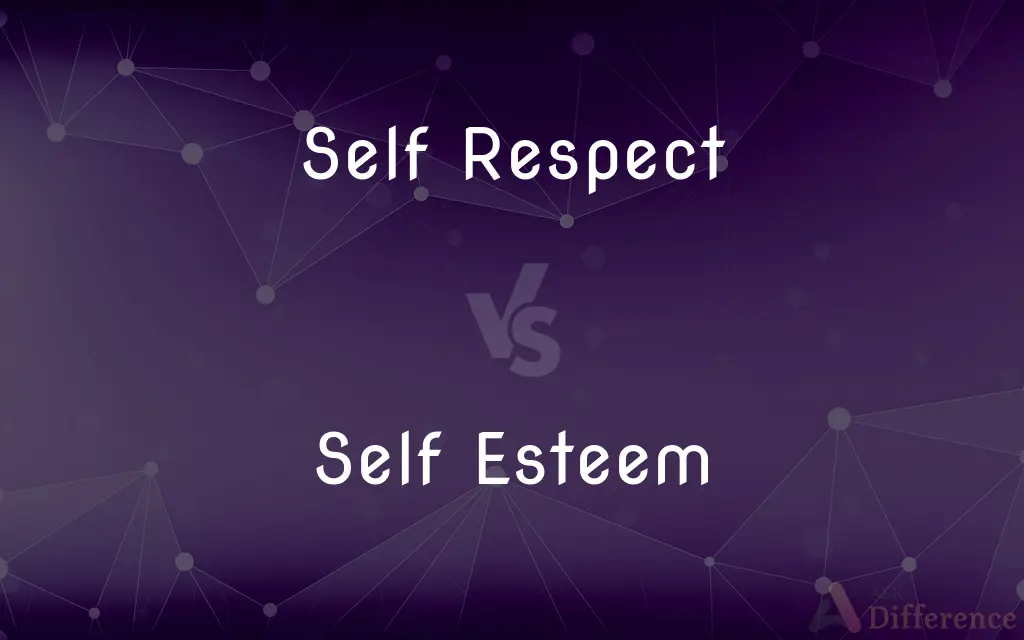Self Respect vs. Self Esteem — What's the Difference?
By Tayyaba Rehman — Published on January 8, 2024
Self respect refers to the regard one holds for oneself and one's standards and principles, while self esteem is the overall emotional evaluation of one's own worth.

Difference Between Self Respect and Self Esteem
Table of Contents
ADVERTISEMENT
Key Differences
Self respect is about valuing one's dignity, maintaining one's principles, and asserting oneself appropriately. It involves setting boundaries and being true to personal values. Self esteem, on the other hand, relates to how one perceives and values their abilities, qualities, and overall worth as a person.
Self respect is often action-oriented, reflecting the way one behaves and treats oneself in various situations. It is about respecting one's own needs, desires, and wellbeing. Self esteem is more about internal feelings and thoughts, encompassing one's beliefs about their competence and value.
While self respect is about honoring one's own worth and values, it doesn't necessarily require comparing oneself to others. Self esteem can be influenced by external factors and comparisons, including how one believes they are perceived by others.
Someone with high self respect may not always have high self esteem; they can respect themselves but still struggle with feelings of unworthiness. Conversely, a person with high self esteem might sometimes act against their own values, indicating lower self respect.
Developing self respect is about strengthening one's character and integrity, while boosting self esteem involves enhancing one's confidence and belief in personal capabilities.
ADVERTISEMENT
Comparison Chart
Focus
Valuing one's dignity and principles.
Emotional evaluation of one's own worth.
Nature
Action-oriented, based on behavior.
Emotionally oriented, based on perception.
Influence Factors
Personal values and integrity.
External factors and self-perception.
Internal vs External
More about internal standards.
Can be influenced by external comparisons.
Relationship to Others
Less about comparison to others.
Often influenced by how one is viewed by others.
Compare with Definitions
Self Respect
It involves asserting oneself and setting boundaries.
His self respect led him to say no to excessive work demands.
Self Esteem
Self esteem is the evaluation of one’s own worth.
After her success, her self esteem greatly improved.
Self Respect
It’s about respecting one’s needs and well-being.
Taking a mental health day was a choice in self respect.
Self Esteem
It’s how one feels about their abilities and qualities.
His talent in art contributes to his high self esteem.
Self Respect
Self respect is independent of others’ opinions.
He pursued his unconventional career with self respect, regardless of criticism.
Self Esteem
It encompasses one's belief in their competence.
Good grades in school boosted her self esteem.
Self Respect
Self respect is honoring your own worth and values.
She declined the unfair offer, showing her self respect.
Self Esteem
Self esteem can fluctuate based on achievements and failures.
Her self esteem lowered after the project’s failure.
Self Respect
Self respect is maintaining personal integrity.
Despite pressure, she maintained her self respect by sticking to her principles.
Self Esteem
Self esteem is affected by perceived external validation.
Compliments from her peers elevated her self esteem.
Self Respect
Due respect for oneself, one's character, and one's conduct.
Self Esteem
Pride in oneself; self-respect.
Self Respect
The knowledge of one's own worth, valuing one's self; pride.
Self Esteem
Confidence in one's own worth; self-respect.
Self Respect
Respect for one's self; regard for one's character; laudable self-esteem.
Self Esteem
The holding a good opinion of one's self; self-complacency.
Self Respect
The quality of being worthy of esteem or respect;
It was beneath his dignity to cheat
Showed his true dignity when under pressure
Self Esteem
A feeling of pride in yourself
Self Esteem
The quality of being worthy of esteem or respect;
It was beneath his dignity to cheat
Showed his true dignity when under pressure
Common Curiosities
Is self respect always present with high self esteem?
No, one can have high self esteem but lack self respect.
Does self esteem only come from personal achievements?
No, it also comes from self-acceptance and personal beliefs.
Can external success guarantee high self esteem?
Not always, as self esteem is also influenced by internal beliefs.
Is self respect linked to one’s morals?
Yes, it often aligns with personal morals and ethics.
Can therapy improve self esteem?
Yes, therapy can help address underlying issues affecting self esteem.
Does societal influence impact self respect?
It can, but self respect is more about personal standards.
Is self esteem innate or developed?
It’s developed through experiences and internalization of beliefs.
Can self respect be learned?
Yes, through personal development and understanding one’s worth.
Is self respect a constant trait?
It can fluctuate based on situations and choices.
Can self respect change over time?
Yes, as one's values and understanding of self evolve.
Does high self esteem mean one is always confident?
Not necessarily, as confidence can vary in different areas of life.
Can success in social relationships boost self esteem?
Yes, positive social interactions can enhance self esteem.
Does self respect influence decision-making?
Yes, it guides choices aligned with personal values and integrity.
Are self esteem issues common?
Yes, many people struggle with self esteem at some point.
Does self respect require self-awareness?
Yes, self-awareness is key to developing and maintaining self respect.
Share Your Discovery

Previous Comparison
Folkways vs. Mores
Next Comparison
Glycosidic Bond vs. Peptide BondAuthor Spotlight
Written by
Tayyaba RehmanTayyaba Rehman is a distinguished writer, currently serving as a primary contributor to askdifference.com. As a researcher in semantics and etymology, Tayyaba's passion for the complexity of languages and their distinctions has found a perfect home on the platform. Tayyaba delves into the intricacies of language, distinguishing between commonly confused words and phrases, thereby providing clarity for readers worldwide.











































